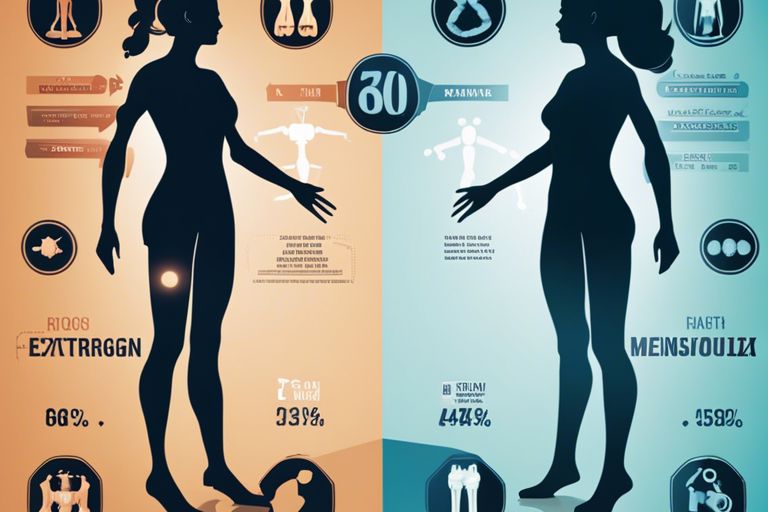Menopause is a natural biological process that occurs in women typically in their late 40s or early 50s, signalling the end of their reproductive years. One significant aspect of menopause that often goes overlooked is its impact on bone health. During menopause, a woman’s hormonal balance undergoes significant changes, particularly a decrease in estrogen levels. This hormonal change can lead to a loss of bone density, making women more susceptible to conditions like osteoporosis. In this blog post, we will explore into the effects of menopause on bone health and explore ways to mitigate the risks associated with this hormonal transition.
Key Takeaways:
- Menopause can lead to a rapid decline in bone density, increasing the risk of osteoporosis.
- Reduced levels of estrogen during menopause can weaken bones and make them more susceptible to fractures.
- Weight-bearing exercises and a diet rich in calcium and vitamin D can help improve bone health during menopause.
- Regular bone density scans are important for monitoring changes in bone health and assessing the risk of osteoporosis.
- Consulting a healthcare professional for a personalised plan, including hormone replacement therapy, can help minimise the impact of menopause on bone health.
The Science of Menopause and Bone Density
Hormonal Changes During Menopause
During menopause, the body undergoes significant hormonal changes, particularly a decrease in estrogen levels. This drop in estrogen can have a direct impact on bone health, leading to a decrease in bone density and an increased risk of osteoporosis.
The Role of Estrogen in Bone Metabolism
Estrogen plays a crucial role in bone metabolism by regulating the activity of osteoblasts and osteoclasts, the cells responsible for building and breaking down bone tissue. When estrogen levels decline during menopause, this balance is disrupted, leading to increased bone resorption and decreased bone formation.
Risks and Implications of Bone Density Loss
Understanding Osteoporosis and Fracture Risks
Osteoporosis is a condition characterised by weakened bones, making them more susceptible to fractures. During menopause, the decline in oestrogen levels can accelerate bone loss, leading to a higher risk of developing osteoporosis. Fractures, especially in the hip, spine, and wrist, are common in individuals with low bone density.
Long-Term Health Consequences
Long-term consequences of untreated bone density loss can have serious implications on an individual’s overall health. Increased fragility due to osteoporosis can result in debilitating fractures that impact mobility and independence. Furthermore, fractures may lead to complications such as chronic pain, reduced quality of life, and even mortality.
It is crucial for menopausal individuals to prioritise bone health through lifestyle modifications, adequate calcium and vitamin D intake, weight-bearing exercises, and, if necessary, medication. Regular bone density screenings and consultation with healthcare professionals are necessary in managing and mitigating the risks associated with bone density loss during menopause.
Prevention and Management Strategies
Nutritional Recommendations for Bone Health
Ensuring a diet rich in calcium, vitamin D, and other imperative nutrients is crucial for maintaining strong and healthy bones. Foods such as dairy products, leafy green vegetables, nuts, and oily fish can help support bone health. It’s also important to limit the intake of caffeine, alcohol, and salt, as these can have a negative impact on bone density.
Exercise and Lifestyle Choices to Strengthen Bones
Regular weight-bearing exercises such as walking, jogging, and strength training can help strengthen bones and reduce the risk of osteoporosis. Maintaining a healthy weight, avoiding smoking, and limiting alcohol consumption are also important lifestyle factors that can contribute to better bone health.
Exercise plays a crucial role in maintaining bone health by stimulating bone growth and strength. Weight-bearing and resistance exercises help to put pressure on the bones, which in turn encourages them to rebuild and become stronger. Incorporating a variety of exercises that target different muscle groups can further enhance bone health.
Medications and Treatments Available
In cases where lifestyle changes and nutritional adjustments are not sufficient, healthcare providers may recommend medications or treatments to help manage bone health. These can include hormone therapy, bisphosphonates, and calcium supplements, among others. It’s important to consult with a healthcare professional to determine the most suitable treatment options based on individual needs and health status.
Medications and treatments can help slow down bone loss, increase bone density, and reduce the risk of fractures in individuals at risk of osteoporosis. It’s important to undergo regular monitoring and follow-up appointments to ensure the effectiveness and safety of the chosen treatment plan.
Understanding the Impact of Menopause on Bone Health
Menopause poses significant challenges to bone health due to the decrease in oestrogen levels, leading to an increased risk of osteoporosis and fractures. It is crucial for women going through menopause to focus on maintaining a healthy lifestyle, incorporating weight-bearing exercises, adequate calcium and vitamin D intake, and regular screenings to monitor bone density. By understanding the effects of menopause on bone health and taking proactive steps to address them, women can reduce the risks associated with decreased bone density and maintain strong and healthy bones as they age.
FAQ
Q: What is menopause and how does it affect bone health?
A: Menopause is a natural biological process that marks the end of a woman’s menstrual cycles. During menopause, a decrease in estrogen levels can lead to bone loss and increase the risk of osteoporosis.
Q: What are the effects of declining estrogen levels on bone health during menopause?
A: Declining estrogen levels during menopause can accelerate bone loss, weaken bone density, and increase the risk of fractures and osteoporosis in women.
Q: How can menopausal women maintain good bone health?
A: Menopausal women can maintain good bone health by engaging in regular weight-bearing exercises, consuming a calcium-rich diet, getting enough vitamin D, and avoiding smoking and excessive alcohol intake.
Q: When should menopausal women consider bone density testing?
A: Menopausal women should consider bone density testing if they have significant risk factors for osteoporosis, such as a family history of the condition, a petite frame, or a history of fractures. Discussions with a healthcare provider can help determine the appropriate timing for testing.
Q: What role do lifestyle choices play in mitigating the effects of menopause on bone health?
A: Making healthy lifestyle choices such as regular exercise, maintaining a balanced diet rich in calcium and vitamin D, and avoiding smoking and excessive alcohol consumption can help mitigate the effects of menopause on bone health and reduce the risk of osteoporosis.





